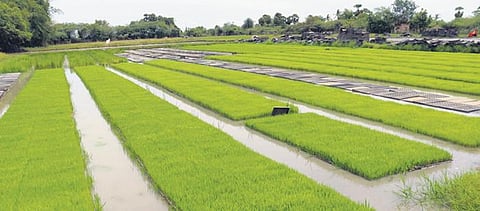

THANJAVUR: The cut-off date for farmers to pay premium is hardly 10 days away but only about 8% of the acreage under which samba and thalady paddy cultivation has been undertaken in the district has been insured so far, official data revealed.
While last year’s coverage under the Pradhan Mantri Fasal Bima Yojana (PMFBY) stood at more than 90%, a section of farmers attribute this year’s low figure to the “disappointment” over the “declining” number of claims honoured by insurance companies.
According to Agriculture and Farmers Welfare Department officials, out of the target 1.36 lakh hectares of samba and thalady cultivation, the seasonal paddy over 88,000 hectares has been transplanted. Farmers, however, have paid crop insurance premium only to an extent of 6,500 hectares so far, they pointed out.
The premium works out to Rs 548 per acre for an assured sum of Rs 36,500 per acre. While more farmers are expected to insure their crop as the cut-off date of November 15 for payment of premium nears, R Sukumaran, a farmer from Orathanadu, said the coverage would still fall below last year's figure of 90%.
This year the insurance coverage by cut-off date might touch 40% at the best, he added. Offering reasons, he said, "Last year farmers paid the insurance premium as the [River Cauvery] water release from Mettur dam was stopped in October itself, instead of the customary date of January 28, due to poor flow."
Hence fearing crop failure from lack of water, a large number of farmers insured their crop at the eleventh hour before the cut-off date, he added. Though many faced yield loss, the insurance claims of farmers in only a handful of villages were paid. This year the storage in Mettur dam is also comfortable.
This adds to the reluctance shown by farmers hopeful of getting good yield, he further said. While echoing his views, AKR Ravichander, a farmer from Tiruvaiyaru, alleged that representatives of private insurance companies, in connivance with local officials, manipulated the measurement of yield during crop cutting experiments, leading to denial of claims even to farmers in villages where there was yield loss.